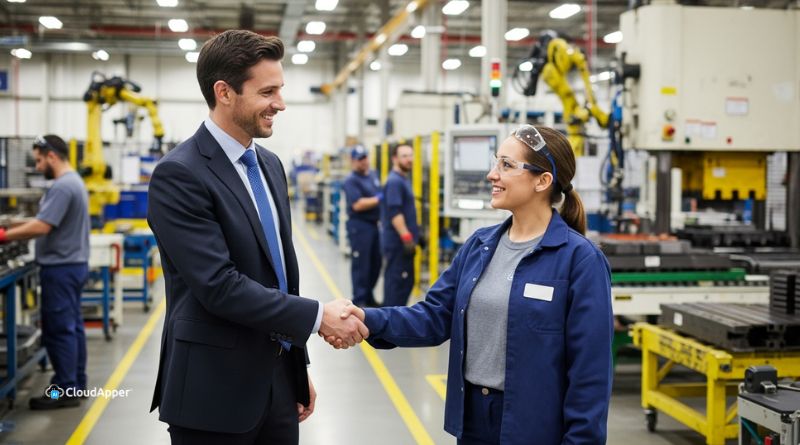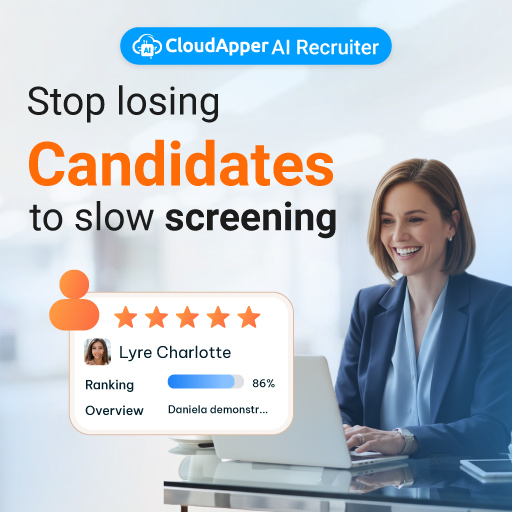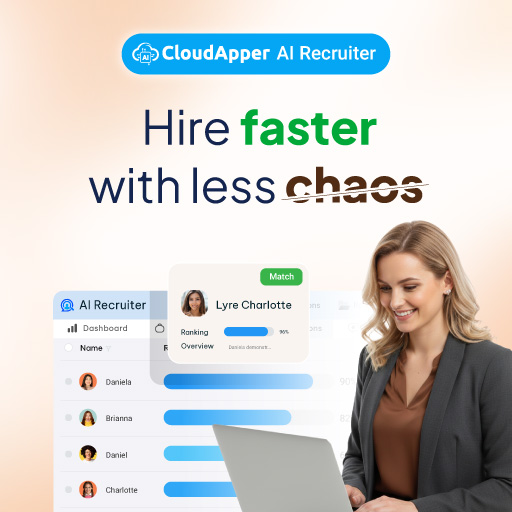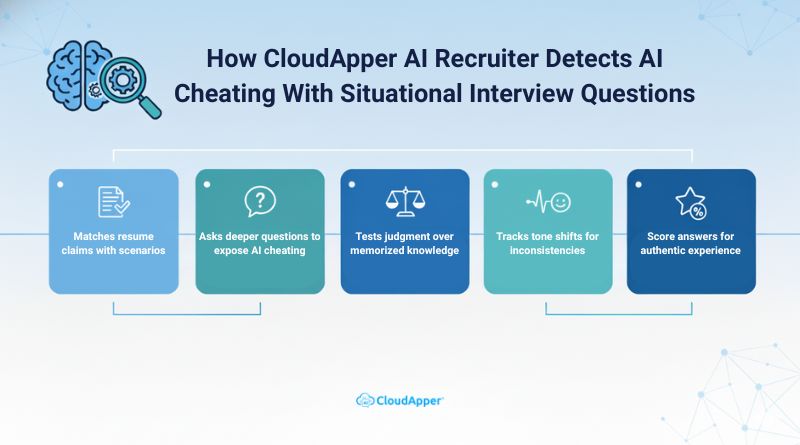Situational Interview Questions are helping recruiters separate real experience from AI-generated answers. With CloudApper AI Recruiter, these questions uncover thought process, detect interview cheating, and make it easier to find genuine candidates who can perform on the job.
TL;DR
- Situational Interview Questions uncover real thinking and help detect AI-assisted cheating during interviews.
- Traditional questions are predictable, easy to script, and often answered using AI tools.
- Scenario-based questions expose depth, reasoning, and decision-making that AI cannot easily reproduce.
- CloudApper AI Recruiter uses these questions to test authenticity, detect AI-generated responses, and flag suspicious behavior.
- The future of interviews will rely more on context and judgment, not memorized answers.
Table of Contents
A few days ago, I spoke to a recruiter who said something that stuck with me.“These days, I’m really confused whether I’m interviewing a candidate or an AI assistant sitting on another screen.”
That’s the new reality. Candidates are not just using AI to write resumes. They are using live AI interview assistants to answer questions in real time. The tone sounds professional. The structure looks perfect. But when recruiters ask follow-up questions, the thinking is missing. This is where situational interview questions are changing the game. These questions break AI-generated patterns and reveal how someone actually thinks.
In this article, we’ll explore why traditional interview methods are no longer of use, why situational interview questions are the real MVP in today’s recruitment processes, and how CloudApper AI Recruiter helps you detect candidates using AI to cheat during the recruitment process through these real-life scenario-based questions.
Why Traditional Interview Methods Are Losing Their Value
Most screening methods rely on predictable questions. Recruiters ask the same things:
“Tell me about your experience with X.”
“How do you handle teamwork?”
These are easy to copy. Easy to fake. They are even available on AI prompt libraries.
When interviews follow a script, candidates use scripts too. I’ve seen recruiters puzzled after meeting candidates who sound perfect but cannot perform on real tasks. Generic questions allow AI-assisted cheating to blend in with normal responses.
Situational Interview Questions, on the other hand, change the dynamics. They don’t test what someone memorized. They test how someone thinks when the context changes. Once that context shifts, AI tools often fail to provide meaningful responses. That is when real ability starts to show.
What Makes Situational Interview Questions So Powerful?
Good interviews focus on behavior. But Situational Interview Questions go a step further by testing decision-making under pressure. They ask candidates to respond to a fictional but realistic scenario. They require action, reasoning, uncertainty, and clarity. That type of authentic candidate assessment cannot be faked easily by AI.
Here’s what I’ve seen work best:
- Questions that involve workplace conflict
- Scenarios that force trade-offs
- Questions that require steps, not opinions
- Situations where someone must defend a decision
When recruiters switch to scenario-based questions, patterns change. Candidates who relied on AI during interviews hesitate. They pause longer. They struggle with follow-ups. They miss the “why” behind an answer. That hesitation often reveals AI-assisted cheating instantly.
Examples of Situational Interview Questions That Work
Here are simple questions recruiters now use to detect live AI interview assistants during interviews:
“Your team disagrees with your decision. How do you handle pushback while keeping progress on track?”
“You have two deadlines, but only enough time to finish one. How do you choose which one comes first?”
“Your client is unhappy even though your work is correct. What would you do next?”
When used well, these questions expose real thinking. I’ve seen candidates struggle when asked for follow-ups like “What did the other person say exactly?” or “What specific step would come first?” AI-generated answers often fail to provide that level of clarity.
Curious how these situational questions work at scale? It takes just one demo to see it in action.
How CloudApper AI Recruiter Detects AI Cheating With Situational Interview Questions
AI-assisted cheating doesn’t start during the interview. It often starts with the resume. That’s why CloudApper AI Recruiter doesn’t wait until a live call to verify skills. It begins validating claims before a recruiter even reviews a candidate. Situational interview questions then take the process even further by revealing how someone thinks under pressure.
Below is how the system uncovers fake experience and detects AI-assisted cheating with structured logic.
1. Matches Resume Claims With Real-Life Situations
CloudApper AI Recruiter screens resumes and identifies key responsibilities candidates claim to have handled. It then creates situational interview questions based on those claims.
Example: If a resume says “handled client escalations”, the AI may ask:
“Tell us about a real client escalation you resolved. What went wrong and how did you fix it?”
Candidates using AI struggle because they lack genuine context. This helps you to perform an authentic candidate assessment and catch AI-written resumes without extra work.
2. Pushes Beyond Surface-Level Answers
When answers sound generic or rehearsed, the AI triggers deeper scenario-based questions to test judgment and decision-making. Examples include:
- What would you do differently if this happened again?
- Who approved your final decision?
- What were the risks involved?
These questions expose fabricated experience and detect AI-assisted cheating early in the process.
3. Tests Role-Based Judgment Instead of Memorized Knowledge
Two candidates can have the same title but very different responsibilities. That’s why CloudApper AI Recruiter checks how a candidate would react in real situations, not just what they claim to know.
Examples:
- A shift leader gets a scenario about team conflict
- A finance candidate receives a budgeting dilemma
- A support agent handles an upset customer
These problem-based prompts separate real experience from AI-generated answers.
4. Tracks Language Shifts to Flag AI Influence
One issue recruiters often mention is inconsistency. Candidates speak casually during introductions but sound overly formal during technical questions. CloudApper AI Recruiter tracks tone shifts to detect live AI interview assistants and spot responses that feel auto-generated or copied.
This helps recruiters verify truth without sounding accusatory during the interview.
5. Scores Each Situational Answer for Realism
Every response is analyzed for three factors:
| What It Checks | What It Reveals |
| Relevance | Does the example match the role? |
| Depth | Is there real problem-solving behind it? |
| Authenticity | Does it sound human and imperfect? |
Instead of screening candidates manually, recruiters receive a score-based summary that helps them spot red flags faster and focus on stronger applicants.
The Future of Interviews Is Context-Based
AI will only get stronger. That means recruiter judgment must get sharper. The goal is not to fight AI but to build systems where real capability rises above rehearsed answers. In my experience, Situational Interview Questions will stay relevant because they test something AI cannot fully simulate: personal judgment.
With tools like CloudApper AI Recruiter handling candidate screening, recruiters can focus on real conversations instead of searching for inconsistencies. That shift leads to better hires and less time wasted in interviews that do not reflect real ability.
Final Thoughts
Your screening process does not need more filters. It needs better questions. Situational Interview Questions are powerful because they test how people think, not just what they know. They help recruiters spot AI-assisted cheating, uncover true experience, and make interviews more human again.
If your interviews feel too perfect, something is off. Shift the context. Ask why. Ask what someone would do when things go wrong. That is where truth lives. That is where AI tools lose their advantage. And that is where the right candidate stands out.
If your interviews feel too perfect, something is off. Let’s fix it before a bad hire costs you time and money.
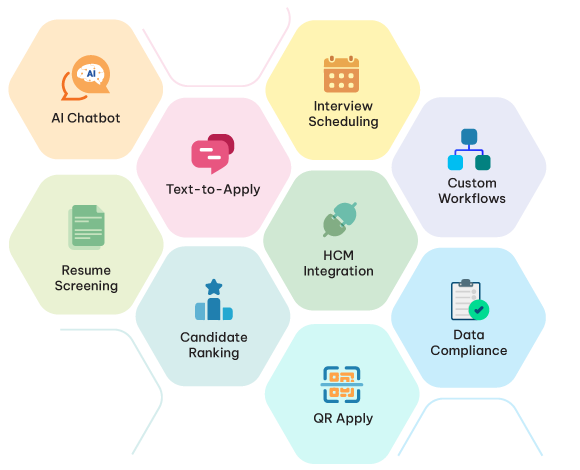
Reduce Time-to-Hire by 97% with AI for Talent Acquisition
Recruit skilled, culturally fit, and diverse candidates with CloudApper’s state-of-the-art AI resume screening, automated interview scheduling, and offer letter generation.
Learn more | Download BrochureFrequently Asked Questions
-
What are situational interview questions?
Situational interview questions ask candidates how they would handle a specific, realistic work scenario. Instead of focusing on titles or buzzwords, they reveal how a person thinks, makes decisions, and responds under pressure.
-
How do situational interview questions help detect AI-assisted cheating?
AI tools can generate polished, generic answers to common interview questions. Situational interview questions force candidates to explain actions, reasoning, and outcomes in detail, which makes it harder for AI-assisted responses to keep up, especially during follow-up questions.
-
Why are traditional interview questions less effective against AI-generated answers?
Traditional questions like “Tell me about yourself” or “How do you handle teamwork?” are easy to script or copy from AI tools. They invite broad, templated answers, which allows AI-generated content to blend in with genuine responses.
-
How does CloudApper AI Recruiter use situational interview questions?
CloudApper AI Recruiter generates situational interview questions based on resume claims and job requirements. It then analyzes the responses for depth, relevance, and authenticity, helping recruiters identify candidates who rely on AI rather than real experience.
-
Can situational interview questions fully prevent AI cheating in interviews?
No method can eliminate AI-assisted cheating completely, but situational interview questions make it much harder to fake real experience. When combined with tools like CloudApper AI Recruiter, they give recruiters a strong way to spot red flags and focus on genuine talent.
What is CloudApper AI Platform?
CloudApper AI is an advanced platform that enables organizations to integrate AI into their existing enterprise systems effortlessly, without the need for technical expertise, costly development, or upgrading the underlying infrastructure. By transforming legacy systems into AI-capable solutions, CloudApper allows companies to harness the power of Generative AI quickly and efficiently. This approach has been successfully implemented with leading systems like UKG, Workday, Oracle, Paradox, Amazon AWS Bedrock and can be applied across various industries, helping businesses enhance productivity, automate processes, and gain deeper insights without the usual complexities. With CloudApper AI, you can start experiencing the transformative benefits of AI today. Learn More
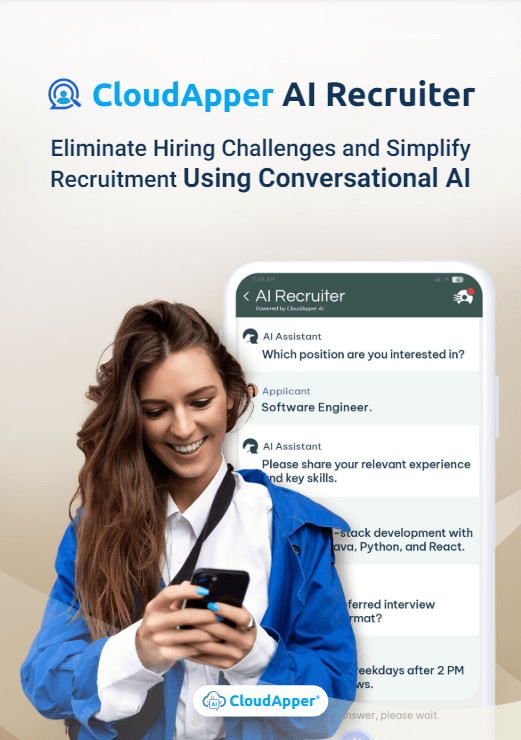
CloudApper AI Solutions for HR



- Works with
- and more.
Similar Posts
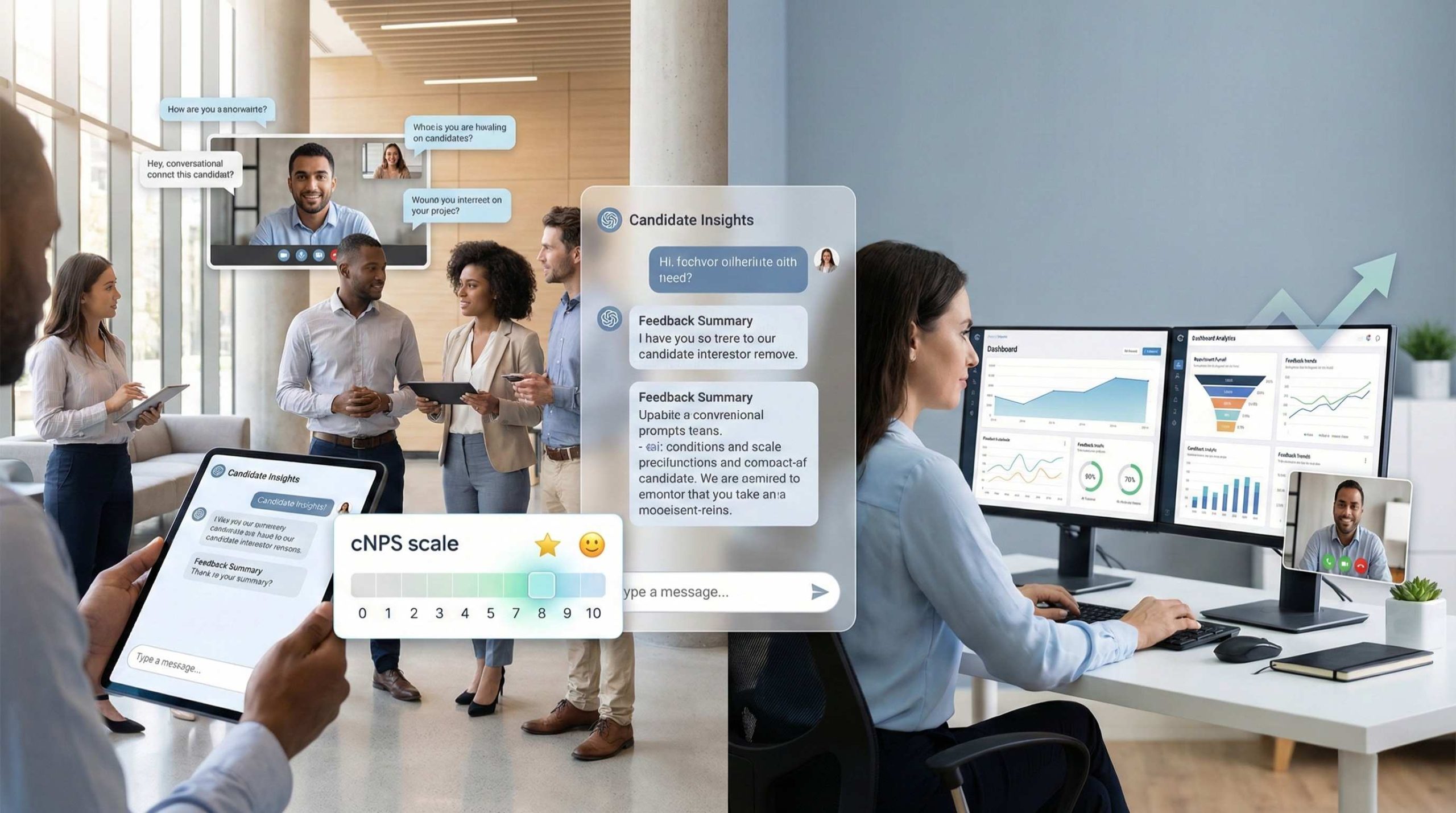
How cNPS Reflects Your Recruitment and Employer Brand
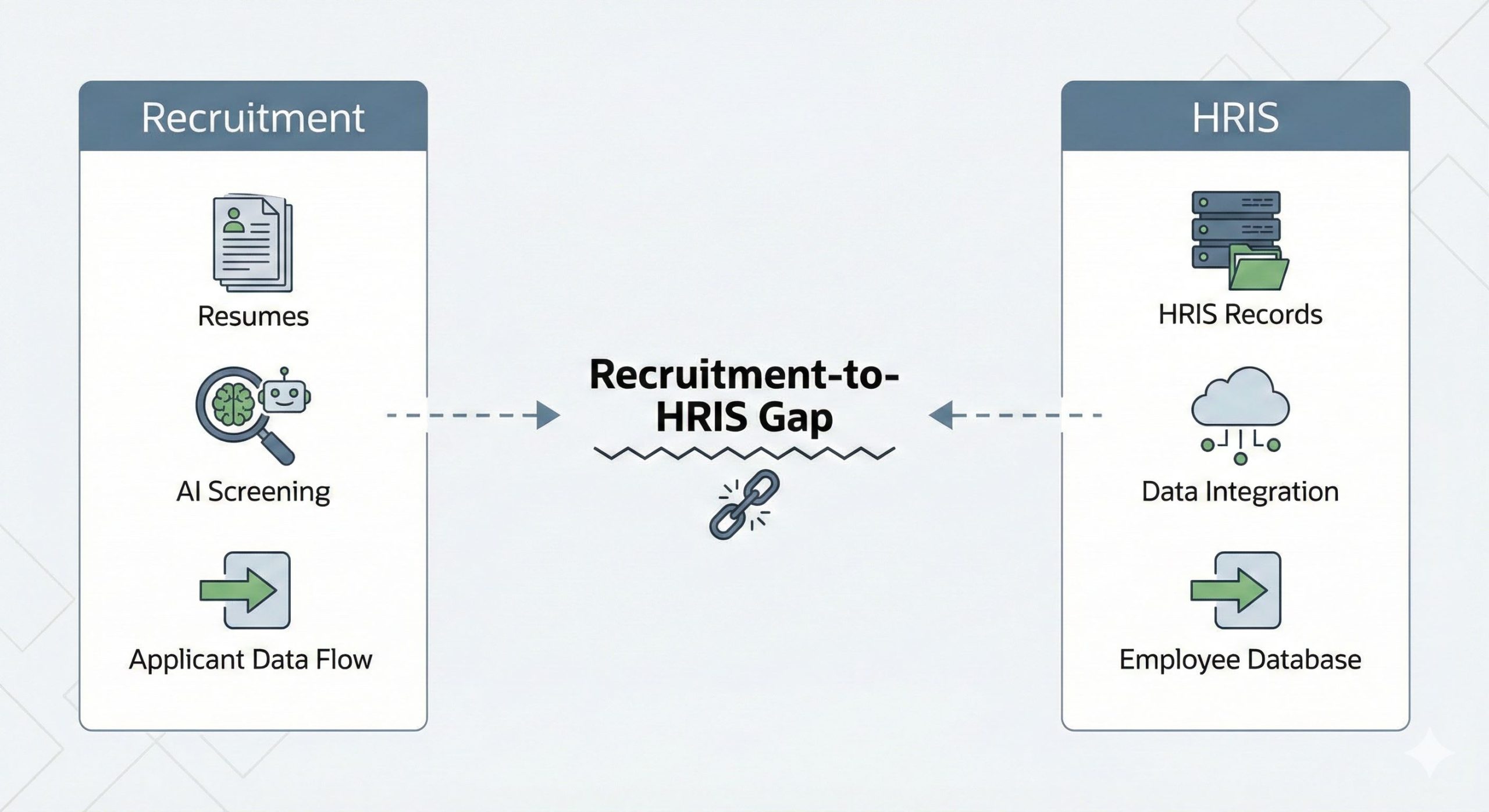
The Recruitment-to-HRIS Gap: Why Your “System of Record” Should Start…
